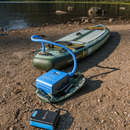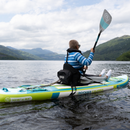TAKING A CLOSER LOOK AT CORAL REEFS

With the highest biodiversity of any ecosystem on the planet—even more than the tropical rainforest—coral reefs support 25% off all ocean life. But they occupy less than 1% of the ocean floor and are at extreme risk, with rising ocean temperatures killing about 14% of the world’s coral reefs in just under a decade.
Climate change, overfishing, coastal development, and declining water quality is stressing our ocean’s reefs and putting their future at extreme risk. With that risk comes not only the loss of thousands of species, but also affects the millions around the world who rely on healthy coral reefs for food, income, recreation, and protection from storms.
Want to help turn the tide? This World Reef Day, take steps towards helping protect our coral reefs for future paddlers and the marine life that rely on these magical ecosystems.
- Always practice safe diving and snorkeling. Whether you’re out on your SUP or just swimming along, avoid touching reefs or anchoring yourself on the reef. If you want to drop anchor and explore a bit, look for a sandy bottom or use moorings if available.
- Wear reef-safe sunscreen. Many sunscreens contain ingredients that can be harmful to corals. Look for reef-safe sunscreens or cut down on sunscreen use by wearing a long-sleeved shirt or rash guard to protect your skin.
- Always recycle and cut down on single-use plastics. Trash that ends up in the water can be harmful to coral reefs. Recycle when at home and on-the-go and be sure to dispose of trash properly in marked bins to avoid trash being blown away in waterways and oceans. Go the extra step and join a local beach cleanup or help clean your local watershed.
- Conserve water. The less water you use, the less runoff and wastewater that eventually makes its way back into the ocean, adding to the decline in water quality.
- Choose sustainable seafood. When shopping at the grocery store or when out to dinner, opt for wild-caught or farmed seafood that is harvested or produced in ways that protect the long-term health of species populations and ecosystems.
Remember, leave nothing but a wake in the water. We’ll see you out there.






